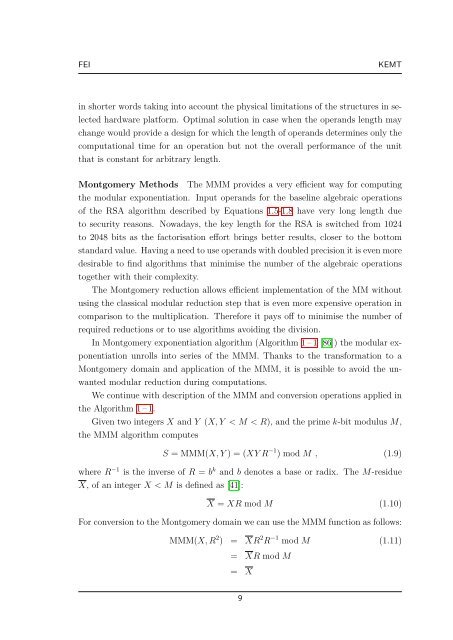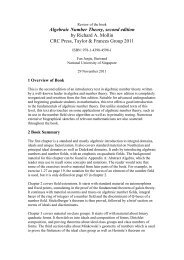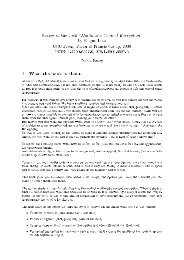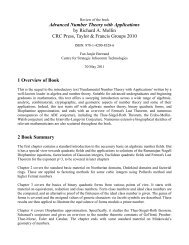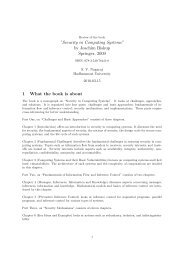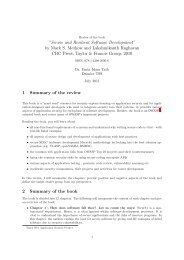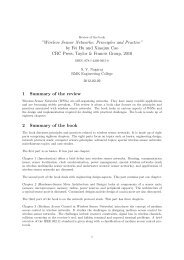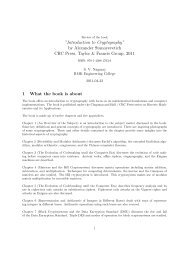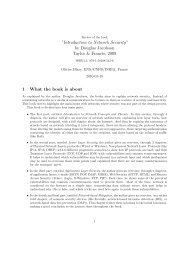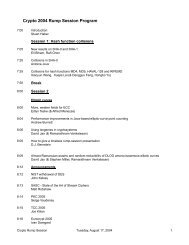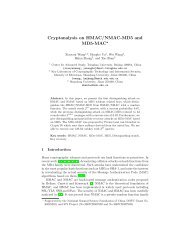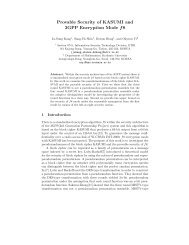1 Montgomery Modular Multiplication in Hard- ware
1 Montgomery Modular Multiplication in Hard- ware
1 Montgomery Modular Multiplication in Hard- ware
Create successful ePaper yourself
Turn your PDF publications into a flip-book with our unique Google optimized e-Paper software.
FEI KEMT<br />
<strong>in</strong> shorter words tak<strong>in</strong>g <strong>in</strong>to account the physical limitations of the structures <strong>in</strong> se-<br />
lected hard<strong>ware</strong> platform. Optimal solution <strong>in</strong> case when the operands length may<br />
change would provide a design for which the length of operands determ<strong>in</strong>es only the<br />
computational time for an operation but not the overall performance of the unit<br />
that is constant for arbitrary length.<br />
<strong>Montgomery</strong> Methods The MMM provides a very efficient way for comput<strong>in</strong>g<br />
the modular exponentiation. Input operands for the basel<strong>in</strong>e algebraic operations<br />
of the RSA algorithm described by Equations 1.5-1.8 have very long length due<br />
to security reasons. Nowadays, the key length for the RSA is switched from 1024<br />
to 2048 bits as the factorisation effort br<strong>in</strong>gs better results, closer to the bottom<br />
standard value. Hav<strong>in</strong>g a need to use operands with doubled precision it is even more<br />
desirable to f<strong>in</strong>d algorithms that m<strong>in</strong>imise the number of the algebraic operations<br />
together with their complexity.<br />
The <strong>Montgomery</strong> reduction allows efficient implementation of the MM without<br />
us<strong>in</strong>g the classical modular reduction step that is even more expensive operation <strong>in</strong><br />
comparison to the multiplication. Therefore it pays off to m<strong>in</strong>imise the number of<br />
required reductions or to use algorithms avoid<strong>in</strong>g the division.<br />
In <strong>Montgomery</strong> exponentiation algorithm (Algorithm 1 – 1 [86]) the modular ex-<br />
ponentiation unrolls <strong>in</strong>to series of the MMM. Thanks to the transformation to a<br />
<strong>Montgomery</strong> doma<strong>in</strong> and application of the MMM, it is possible to avoid the un-<br />
wanted modular reduction dur<strong>in</strong>g computations.<br />
We cont<strong>in</strong>ue with description of the MMM and conversion operations applied <strong>in</strong><br />
the Algorithm 1 – 1.<br />
Given two <strong>in</strong>tegers X and Y (X, Y < M < R), and the prime k-bit modulus M,<br />
the MMM algorithm computes<br />
S = MMM(X, Y ) = (XY R −1 ) mod M , (1.9)<br />
where R −1 is the <strong>in</strong>verse of R = b k and b denotes a base or radix. The M-residue<br />
X, of an <strong>in</strong>teger X < M is def<strong>in</strong>ed as [41]:<br />
X = XR mod M (1.10)<br />
For conversion to the <strong>Montgomery</strong> doma<strong>in</strong> we can use the MMM function as follows:<br />
MMM(X, R 2 ) = XR 2 R −1 mod M (1.11)<br />
= XR mod M<br />
= X<br />
9


